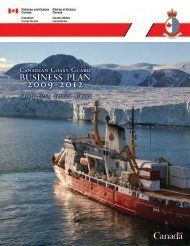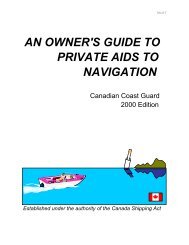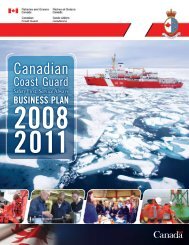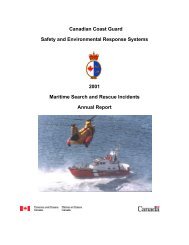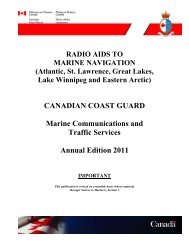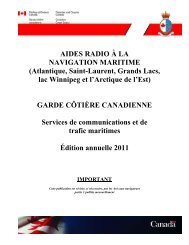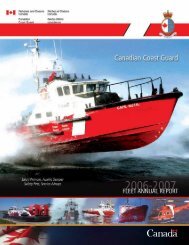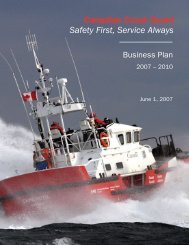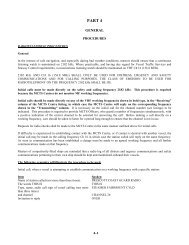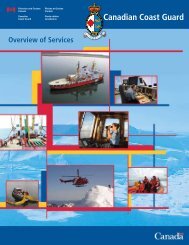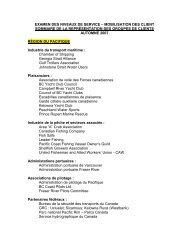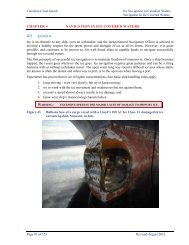RADIO AIDS TO MARINE NAVIGATION - Canadian Coast Guard
RADIO AIDS TO MARINE NAVIGATION - Canadian Coast Guard
RADIO AIDS TO MARINE NAVIGATION - Canadian Coast Guard
Create successful ePaper yourself
Turn your PDF publications into a flip-book with our unique Google optimized e-Paper software.
III.<br />
What and When You Report<br />
A. Sail plan message should be sent on or before departure.<br />
B. Position Reports should be sent within twenty-four hours of departure and subsequently no less frequently<br />
than every forty-eight hours until arrival.<br />
C. Arrival Reports should be sent immediately prior to or upon arrival at the Port of Destination.<br />
D. Reports are to be sent during the Radio Officer’s normal duty hours.<br />
E. At the discretion of the vessel, reports may be sent more frequently than the above schedule, as, for example,<br />
in heavy weather or under other adverse conditions.<br />
IV.<br />
Report Format<br />
As previous Amver participants will note, the format described below represents a change which serves two purposes:<br />
First, the new format will permit the automated data processing system to enter your information into Amver more<br />
accurately and efficiently. Second, the new format conforms with the International Maritime Organization (IMO) proposed<br />
standard, thus reducing the number of different formats in use. As other systems also adopt the IMO format, we will have<br />
moved closer to a single format worldwide.<br />
V. Amver System Communications Network<br />
The following methods are recommended for ships to transmit Amver Sail Plan, Position, Deviation and Arrival reports.<br />
Details are available on the Amver Website at http://www.amver.com<br />
Electronic Mail via the Internet: Amver’s address is: amvermsg@amver.com<br />
AMVER/SEAS “Compressed Message” via Inmarsat-C thru TELENOR:<br />
Amver address: NOAA telephone number entered in the ADDRESSBOOK. For information, please see the instruction<br />
sheet for your brand of Inmarsat-C transceiver. AMVER/SEAS software can be downloaded from the Internet at:<br />
http://seas.amveerseas.noaa.gov/seas/goosplots.html<br />
or requested from:<br />
TELENOR Satellite Services<br />
1101 Wootton Parkway, 10 th Floor<br />
Rockville, Maryland 20852<br />
301-838-7800<br />
Internet E-Mail: customercare@telenor-usa.com<br />
HF Radiotelex Service of U.S. <strong>Coast</strong> <strong>Guard</strong> Communications Stations: Full information on how to send Amver<br />
messages this way can be found at: http://www.navcen.uscg.mil/marcomms/egcomms/call.htm.<br />
HF Radio at no cost via <strong>Coast</strong> <strong>Guard</strong> Contractual Agreements with the following companies:<br />
Globe Wireless Super Station Network<br />
Mobile Marine Radio (WLO)<br />
Telex: Amver Address: (0) 230 127594 AMVERNYK<br />
Telefax: To the USCG Operations Systems Centre in Martinsburg: 304-264-2505<br />
If messages are relayed through <strong>Canadian</strong> <strong>Coast</strong> <strong>Guard</strong> Ships no ship charge will be assessed. All Amver messages<br />
forwarded via the stations listed, should be addressed to Amver Vancouver, rather than COAST GUARD New York, to<br />
ensure that no charge is applied in delivery.<br />
VI.<br />
Amver Voyage Report Types<br />
There are four types of Amver Reports – Sail, Arrival, Position, and Deviation Reports.<br />
A. Reporting format. Each line of Amver Report text starts with a line identifier. Line identifiers are “Amver” or<br />
a single letter. The line identifier and the data items on the line are each separated from each other by a single<br />
slash (“/”). Lines are terminated by two slashes (“//”).<br />
4-25



